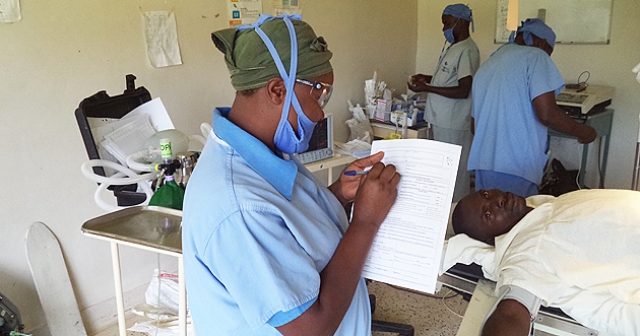Closing doors stops deadly surgical site infections in Uganda
 In Uganda, taking a bath before surgery, closing the door to the operating theatre and ensuring surgeons clean their hands properly can be the difference between life and death. A study involving more than 650 surgical patients, showed the rate of infections halved after new measures were introduced. As a result, patients are spending less time in hospital, resulting in cost-savings for both the patient and the hospital.
In Uganda, taking a bath before surgery, closing the door to the operating theatre and ensuring surgeons clean their hands properly can be the difference between life and death. A study involving more than 650 surgical patients, showed the rate of infections halved after new measures were introduced. As a result, patients are spending less time in hospital, resulting in cost-savings for both the patient and the hospital.
At Kisiizi Hospital in Uganda’s southwest, a World Health Organization programme to reduce the risk of life-threatening infections for patients who undergo surgery is helping to turn the tide with some remarkably simple changes.
Closing the doors to operating theatres, reducing the number of people in theatre, limiting traffic in and out of theatre, and ensuring patients bathe before surgery, are all helping to reduce the number of infections in surgical patients. Other measures include improving surgical skin preparation by using a locally produced alcohol-based antiseptic and waiting for the skin to dry before incision, and using appropriate surgical antibiotic prophylaxis.
Infections halved
The results are encouraging. In a 2014 study involving more than 650 surgical patients, the rate of infections halved after the new measures were introduced. As a result, patients are spending less time in hospital, resulting in a cost-saving both to them and the hospital.
“Patients used to spend a lot of time and money, and a lot of health workers’ time was spent on management of surgical site infections,” said Gabriel Okumu, Kisiizi Hospital’s general surgeon. “The change has been remarkable.”
Surgical site infections are the most common health care-associated infections in low-and middle-income countries, affecting up to one third of patients who undergo surgery.
Kisiizi’s three surgeons, five junior doctors and eight intern doctors perform about 2,500 operations a year, including Caesarean sections, prostate surgery, hernia operations and even craniotomies. Each presents the risk of a surgical site infection.
“A few simple steps can prevent many of these infections,” said Dr Wondi Alemu, WHO’s representative in Uganda. “Not only does that spare patients needless suffering, it’s also a substantial cost-saving to families, hospitals and Uganda’s health system.”


